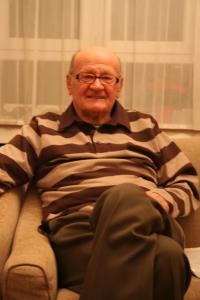My name probably sounded Polish to the Poles. This has saved me

Download image
Alexander Venglář was born April 22, 1920 in Kecskemét in Hungary. His mother was a healthcare worker. He has never seen his father, because he had died before Alexander’s birth. The incomplete family then moved to Slovakia and they eventually settled in Bratislava, where Alexander’s mother married a Czech man who worked there. Soon after they all moved to Prague and settled there. At the beginning of the war Alexander Venglář worked in the Jawa factory which produced pumps for Junkers airplanes. A three-member resistance cell formed there, and worked jointly with the illegal group Pankrác-Vozovna. Their task was a transport of weapons. The plan was however discovered by the Gestapo, which began with arrests in spring 1943. Many employees from the Jawa company got arrested, including Mr. Venglář, who was tricked to go out to the gatehouse and arrested there. He was interrogated by the Gestapo several times in the Petschek Palace and he had to face confrontation with his coworkers who were also interrogated. He was imprisoned in Pankrác and then sent with the others to Terezín. Later he was sent to the east to Auschwitz. After cruel introduction, when the prisoners had to stand naked and wet in a snowstorm, Alexander Venglář became sick. He survived only by a miracle. The camp administration didn’t send him to death, and he was thus lying in hospital till September 1943. He has passed two selections. The second selection sent him to the concentration camp Buchenwald. After entry procedures he went to hospital again. After his treatment he began with regular work in the camp. Czech prisoners were transported to the ancillary camp in Dora, which was infamous for its underground factories where prisoners worked and slept. Mr. Venglář was repairing cars and toiling hard when doing stonework. In 1944 he got to the ancillary camp in Elrich. He worked in a storage room where he was responsible for everything which was stored inside. This was a difficult task in times of great hunger. At the end of the war when the front was approaching, all the prisoners were taken to the camp Bergen-Belsen. He experienced liberation in this camp. After the war Mr. Venglář married and began studying the Pedagogical Faculty. Till 1988 he was working as a civil servant, at first at the Ministry of Labour and Social Affairs, later at the Ministry of Foreign Affairs. Owing to his work, he also lived in Iran, Bangladesh and Pakistan for some time. present he lives in Prague with his wife. He is a member of the Czech Association of Freedom Fighters and the historical group Dora.
